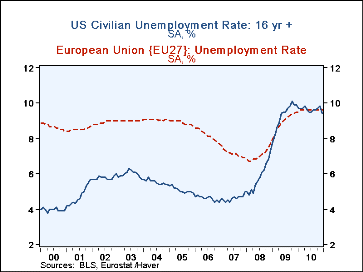 Global| Feb 01 2011
Global| Feb 01 2011Unemployment Remains Dead Flat
Summary
There has been little progress made on reducing unemployment. Since the recession ballooned unemployment rates in the US and in Europe those rates have largely stayed there- higher. Germany has managed to reduce its rate noticeable [...]
 There has been little progress made on reducing unemployment. Since the recession ballooned unemployment rates in the US
and in Europe those rates have largely stayed there- higher. Germany has managed to reduce its rate noticeable and it stands
pretty much alone in this accomplishment. Despite that improvement, Germany has not been able to a revive consumption spending,
leaving Germany's achievement as a pretty empty one.
There has been little progress made on reducing unemployment. Since the recession ballooned unemployment rates in the US
and in Europe those rates have largely stayed there- higher. Germany has managed to reduce its rate noticeable and it stands
pretty much alone in this accomplishment. Despite that improvement, Germany has not been able to a revive consumption spending,
leaving Germany's achievement as a pretty empty one.
Unemployment has edged lower in the US and in Europe in recent months. But the way ahead is still unclear with austerity still being implemented across Europe and debated in the US. In Europe with the UK and Ireland, in particular, set to receive large doses of austerity and the UK economy seemingly already reeling under the strain the outlook for employment is still clouded.
But nothing in Europe is ever as simple as it may seem. Even with the UK economy having posted a negative GDP report ahead on the onset of its austerity measures it also posted a hike in its MFG PMI in January; a reading which continues on a long run of positive and increasing readings.
But nothing in Europe is ever as simple as it may seem. Even with the UK economy having posted a negative GDP report ahead on the onset of its austerity measures it also posted a hike in its MFG PMI in January; a reading which continues on a long run of positive and increasing readings.
Germany's economy for all its performance cannot get consumer spending into positive territory.
Spain 's unemployment rate has come down only grudgingly, but its new social compact has kept the wolves from the door as S&P has stopped downgrading Spain…at least for the moment.
And for the moment there are distractions in Tunisia, Yemen, Jordan and, of course in Egypt. There is a lot in play besides 'simple economics.' And there is a lot of complicated geopolitics on top of it all. Expect the market reactions to continue to be difficult to puzzle out as markets are going to have to sort out and prioritized the economic and geopolitical news all which is spinning out of control at the same time.
| Unemployment Rate And Changes | ||||||
|---|---|---|---|---|---|---|
| Rate | Level | Simple Changes | ||||
| Dec-10 | Nov-10 | Oct-10 | 3-Mo | 6-Mo | 12-Mo | |
| EU-Urate | 9.6 | 9.6 | 9.6 | 0 | 0 | 0.1 |
| EMU-Urate | 10.0 | 10.0 | 10.1 | 0 | 0 | 0.1 |
| Unemployment rate and changes | M/M% | % Changes (AR) | ||||
| EU-U 000s | -0.1% | -0.3% | 0.4% | 0.0% | 0.3% | 1.9% |
| EMU-U 000s | -0.5% | -0.4% | 0.4% | -0.5% | -0.2% | 1.1% |
| U-Rates | Level | Simple Changes | ||||
| Germany | 6.6 | 6.6 | 6.6 | 0 | -0.2 | -0.8 |
| France | 9.7 | 9.7 | 9.7 | 0 | 0 | -0.2 |
| Spain | 20.2 | 20.4 | 20.6 | -0.4 | 0 | 1.1 |
| Ireland | 13.8 | 13.9 | 13.9 | -0.1 | 0.2 | 0.9 |
| USA | 9.4 | 9.8 | 9.7 | -0.2 | -0.1 | -0.5 |
| Japan | 4.9 | 5.1 | 5.1 | -0.1 | -0.4 | -0.3 |
Robert Brusca
AuthorMore in Author Profile »Robert A. Brusca is Chief Economist of Fact and Opinion Economics, a consulting firm he founded in Manhattan. He has been an economist on Wall Street for over 25 years. He has visited central banking and large institutional clients in over 30 countries in his career as an economist. Mr. Brusca was a Divisional Research Chief at the Federal Reserve Bank of NY (Chief of the International Financial markets Division), a Fed Watcher at Irving Trust and Chief Economist at Nikko Securities International. He is widely quoted and appears in various media. Mr. Brusca holds an MA and Ph.D. in economics from Michigan State University and a BA in Economics from the University of Michigan. His research pursues his strong interests in non aligned policy economics as well as international economics. FAO Economics’ research targets investors to assist them in making better investment decisions in stocks, bonds and in a variety of international assets. The company does not manage money and has no conflicts in giving economic advice.






